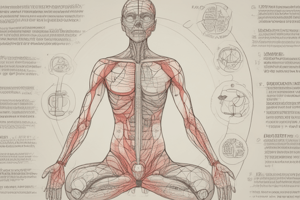Podcast
Questions and Answers
What is the primary purpose of dietary energy intake?
What is the primary purpose of dietary energy intake?
- To decrease body weight
- To increase physical activity levels
- To limit macro and micro nutrients
- To ensure growth and development (correct)
Which of the following factors does NOT affect energy needs?
Which of the following factors does NOT affect energy needs?
- Climate (correct)
- Age
- Gender
- Physical activity level
What does NEAT stand for in the context of energy expenditure?
What does NEAT stand for in the context of energy expenditure?
- Non-Exercise Activity Thermogenesis (correct)
- Non-Educational Activity Thermogenesis
- Minimal Energy Activity Turnover
- Nutritional Energy and Activity Tracking
Which condition is NOT required for calculating Basal Metabolic Rate (BMR)?
Which condition is NOT required for calculating Basal Metabolic Rate (BMR)?
What is indicated by energy sufficiency in relation to body weight?
What is indicated by energy sufficiency in relation to body weight?
How does Resting Metabolic Rate (RMR) differ from Basal Metabolic Rate (BMR)?
How does Resting Metabolic Rate (RMR) differ from Basal Metabolic Rate (BMR)?
Which scenario indicates increased energy needs?
Which scenario indicates increased energy needs?
What measurement condition is important for accurate BMR readings?
What measurement condition is important for accurate BMR readings?
What is the minimum energy required to sustain life known as?
What is the minimum energy required to sustain life known as?
Which of the following conditions is NOT essential for measuring BMR accurately?
Which of the following conditions is NOT essential for measuring BMR accurately?
How do we classify energy insufficiency in relation to body weight?
How do we classify energy insufficiency in relation to body weight?
Which factor is NOT typically associated with increased energy needs?
Which factor is NOT typically associated with increased energy needs?
What role does NEAT play in the context of energy expenditure?
What role does NEAT play in the context of energy expenditure?
In the context of energy requirements, which component is NOT considered part of the total energy expenditure?
In the context of energy requirements, which component is NOT considered part of the total energy expenditure?
Which parameter is critical for an accurate measurement of Resting Metabolic Rate (RMR)?
Which parameter is critical for an accurate measurement of Resting Metabolic Rate (RMR)?
Which of the following best describes the resting metabolic rate (RMR)?
Which of the following best describes the resting metabolic rate (RMR)?
To protect health and ensure growth, dietary energy intake should be based primarily on which of the following?
To protect health and ensure growth, dietary energy intake should be based primarily on which of the following?
What is the significance of a thermoneutral environment when measuring BMR?
What is the significance of a thermoneutral environment when measuring BMR?
Which of the following statements best describes the conditions necessary for measuring Basal Metabolic Rate (BMR)?
Which of the following statements best describes the conditions necessary for measuring Basal Metabolic Rate (BMR)?
What role does age play in determining energy requirements?
What role does age play in determining energy requirements?
In which scenario would the BMR typically be at its lowest?
In which scenario would the BMR typically be at its lowest?
Which of the following factors does NOT influence energy expenditure?
Which of the following factors does NOT influence energy expenditure?
Which statement best describes Resting Metabolic Rate (RMR)?
Which statement best describes Resting Metabolic Rate (RMR)?
What impact does physical activity have on energy expenditure components?
What impact does physical activity have on energy expenditure components?
Which statement accurately reflects the relationship between dietary energy and health?
Which statement accurately reflects the relationship between dietary energy and health?
Which of the following best describes the factors that would indicate increased energy needs?
Which of the following best describes the factors that would indicate increased energy needs?
What contributes to Non-Exercise Activity Thermogenesis (NEAT)?
What contributes to Non-Exercise Activity Thermogenesis (NEAT)?
Flashcards are hidden until you start studying
Study Notes
Energy Requirement
- The body needs dietary energy to ensure growth and development, and to protect health
- Factors affecting energy needs:
- Age
- Gender
- Height
- Body weight
- Physical activity level
- Increased energy needs are present during:
- Childhood and adolescence
- Pregnancy
- Lactation
- Illness and injury
- Stress
- Body weight is an indicator of the sufficiency or insufficiency of energy intake
- It is important to ensure sufficient intake of macronutrients and micronutrients
Body Composition
- The body is broadly divided into fat mass and fat-free mass
- Fat mass is composed of triglycerides and is around 10% of the body mass
- Fat-free mass is composed mainly of water, protein, and minerals, and represents around 50-60% of the body mass
- Muscle mass accounts for around 40% of the body mass
Energy Expenditure
- Energy expenditure is the amount of energy used by the body
- The components of energy expenditure are:
- Basal metabolic rate (BMR)
- Thermic effect of food (TEF)
- Non-exercise activity thermogenesis (NEAT)
- Exercise activity thermogenesis (EAT)
Basal Metabolic Rate (BMR)
- BMR is the minimum energy required to sustain life
- Measured in a thermoneutral environment (26-30°C room temperature)
- Measured before any physical activity (preferably when waking up from sleep)
- Measured at least 10 hours after food intake
- Measured 10 to 12 hours after ingesting nicotine
Resting Metabolic Rate (RMR)
- RMR can be measured any time of the day
- Measured at a moment of absolute rest
- RMR is higher than BMR because it includes the thermic effect of food
- The thermic effect of food is the energy needed to digest, absorb, and metabolize food
Non-Exercise Activity Thermogenesis (NEAT)
- NEAT is the energy expended on all activities outside of formal exercise
- Examples of NEAT activities:
- Fidgeting
- Walking
- Talking
- Doing household chores
- Standing up
Energy Requirements
- Energy intake is crucial for growth, development, and health maintenance.
- Factors influencing energy needs include age, gender, height, body weight, and physical activity level.
- Increased energy requirements are observed during childhood, pregnancy, lactation, illness, injury, and stress.
Body Weight
- Body weight serves as an indicator of energy sufficiency or insufficiency.
- Adequate macro and micronutrient intake is essential alongside energy balance for optimal health.
Energy Expenditure Components
- Basal Metabolic Rate (BMR): Minimum energy required to sustain life when in a thermoneutral environment (26-30°C), before any physical activity (preferably upon waking), and 10-12 hours after food, drink, or nicotine.
- Resting Metabolic Rate (RMR): Measured at any time of the day in a state of absolute rest. This is higher than BMR due to the inclusion of the Thermic Effect of Food (TEF).
- Thermic Effect of Food (TEF): Energy expended digesting, absorbing, and processing food.
- Non-Exercise Activity Thermogenesis (NEAT): Energy expended during everyday activities not classified as exercise.
Measuring BMR
- Conditions:
- Last meal consumed at least 10 hours prior to measurement.
- No medication use.
- Horizontal resting position, free of physical stress.
- Awake state.
- Normal body temperature.
- Ideal and constant room temperature.
Energy Requirements
- Energy requirements are essential for growth, development, and maintaining health
- Factors affecting energy needs include:
- Age
- Gender
- Height
- Body weight
- Physical activity level
Increased Energy Needs
- Individuals with increased energy needs include:
- Children
- Pregnant women
- Lactating women
- Individuals recovering from illness or injury
- Individuals experiencing stress
Body Weight and Energy Balance
- Body weight is an indicator of energy sufficiency or insufficiency.
- It indicates whether macro and micronutrients are adequately consumed.
Components of Energy Expenditure
- Exercise accounts for 10% of energy expenditure
- Non-Exercise Activity Thermogenesis (NEAT) accounts for 20%-40% of energy expenditure.
- Basal Metabolic Rate (BMR) accounts for 50%-60% of energy expenditure
Basal Metabolic Rate (BMR)
- The minimum energy required to sustain life at rest
- Conditions for BMR measurement:
- Thermoneutral environment (26-30°C room temperature)
- Before starting any physical activity (preferably when waking up from sleep)
- 10-12 hours after food, drink, or nicotine
Resting Metabolic Rate (RMR)
- Measured any time of the day
- Measured at a moment of "absolute rest"
- RMR includes BMR and the thermic effect of foods
Thermic Effect of Foods (TEF)
- Energy expenditure associated with digesting, absorbing, and processing food.
Body Mass Index (BMI)
- Body Mass Index (BMI) is a measure of body fat based on height and weight.
Conditions for BMR Measurements
- Food consumption should be at least 10 hours prior to measurement
- No medications should be used
- Measurement should be taken while lying horizontally, away from physical stress
- The individual should not be sleeping
- Body temperature should be within the normal range
- The room temperature should be ideal and constant.
Studying That Suits You
Use AI to generate personalized quizzes and flashcards to suit your learning preferences.




